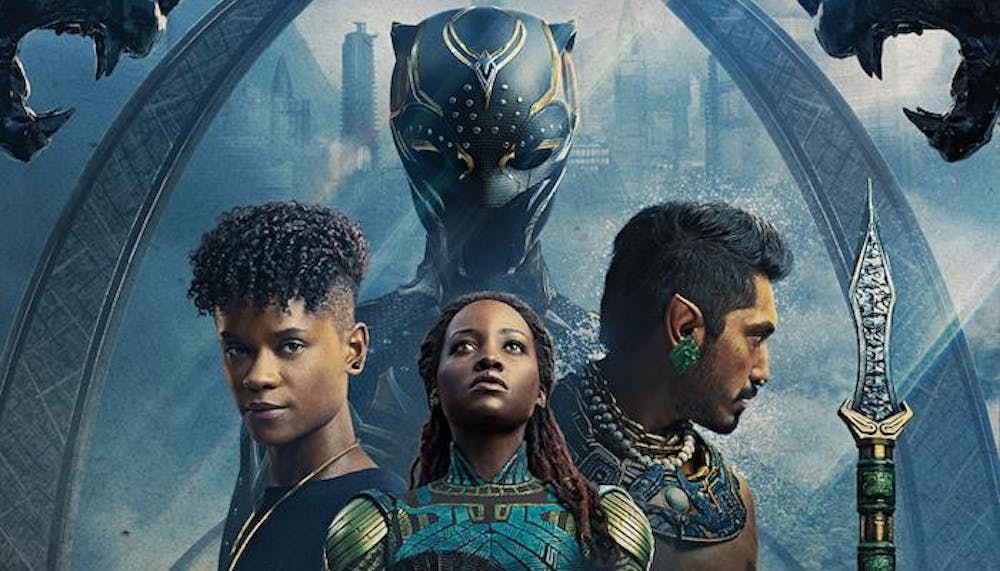After the sudden death of Chadwick Boseman in 2020, the star who embodied the Black Panther while silently suffering from cancer, there was likely not a single movie fan who did not want “Black Panther: Wakanda Forever” to be a resounding success in his honor. And with writer-director Ryan Coogler returning to direct the sequel to 2018’s “Black Panther,” there shouldn’t have been any doubt that it would be. Coogler is the director behind varied hits such as “Fruitvale Station” and “Creed,” and he has carved out a niche for himself in Hollywood as a filmmaker with blockbuster ambition tempered by the humanist sensibilities of an indie artist. As such, the young director approached “Wakanda Forever” well-positioned to take on the emotionally nuanced task of at once delivering a superhero spectacle and a cinematic eulogy. When the credits on the nearly three-hour epic finally roll, however, it’s hard to ignore the realization that even a director as great as Coogler couldn’t do both. Save for its handling of Boseman’s passing in a powerful opening sequence, “Black Panther: Wakanda Forever” is an oddly unsatisfying film that suffers from a critical case of muddled character writing, stranding what could have been a triumphant tribute to a beloved hero on the growing list of Marvel Cinematic Universe (MCU) disappointments.
The film opens with a nation in mourning. T’Challa (Chadwick Boseman), the Black Panther and King of Wakanda, has died of an unknown illness, leaving behind his mother, Ramonda (Angela Bassett), to become queen. Within the secret borders of the African kingdom, Shuri (Letitia Wright), T’Challa’s younger sister and Princess of Wakanda, buries the pain of her brother’s death by immersing herself in scientific innovation. Shuri is disillusioned with her mother’s reliance on rituals to cope with T’Challa’s passing, which leads her to shun the possibility of taking up the ancestral Black Panther mantle in favor of pursuing technological advancement as the key to Wakanda’s future. But when a race of aquatic warriors rises from the ocean depths and infiltrates Wakanda’s once-impenetrable defenses, Shuri must confront her grief for her brother and find the faith to step into his role as the protector of her people.
The first 30 minutes of “Black Panther: Wakanda Forever” consist of some of the most moving passages and exciting action in the MCU’s history. Fans have long wondered how Coogler and his team would incorporate Boseman’s death into the narrative, and the answer they received upon watching the film’s opening sequence could not have been more gratifying. It is a reverent, characteristically understated homage to the ever-humble Boseman that is made even more poignant by the raw performances of the cast and composer Ludwig Göransson’s reference to the “Ancestral Plane” theme from the original film. Coogler likely knew he would need to stage a standout action sequence to ignite the film after such a somber prelude, and he does just that with the introduction of the Dora Milaje, the royal guard of the Black Panther. Led by the fierce Okoye (Danai Gurira), the elite female warriors defend a Wakandan outpost from attack in a skirmish that is expertly cut to the words of Queen Ramonda delivering an impassioned address to the United Nations. This action scene, coupled with Boseman’s tribute, offers real hope for “Wakanda Forever” being one of the best films in the MCU franchise. A good movie demands more than a strong beginning, however, and Coogler’s latest does not sustain the greatness it teases at the outset.
The problem begins and ends with Coogler and co-writer Joe Robert Cole’s treatment of the story element upon which “Wakanda Forever” was destined to succeed or fail: Shuri’s succession of T’Challa as the Black Panther. For the first two hours of the film, Shuri is characterized as being fully dismissive of Wakanda’s need for the Black Panther to return. Her brother is dead, and according to her, so is the Panther. As an audience, we feel the emotional impact that Coogler and Cole are setting up with this character choice, and we can anticipate the stirring moment when plot developments will force Shuri to finally fulfill T’Challa’s legacy by becoming the Black Panther.
That moment comes, but it is not at all stirring. Shuri decides to undergo the ritualistic transformation after a tragic event that may or may not have influenced her decision. When the transformation appears to have failed, Shuri regresses into her former self, lashing out at the futility of the ritual. But when she accidentally discovers that she has superhuman strength, the young hero is suddenly all smiles. Coogler cuts to the money shot of Shuri dropping into the midst of a tribal gathering in full Black Panther attire, the score crescendos to a rousing peak, and we in the audience know that we are supposed to pump our fists.
We can’t, though — that reaction would be insincere. The past 10 minutes have been a whirlwind of unwarranted and rapidly alternating character changes that have left us reeling from emotional whiplash. Why does Shuri all of a sudden believe in the Black Panther? How does she so quickly recover from the disappointment of her ritual experience? Depending on individual interpretation, audience members will find themselves unable to provide answers or settling on ones that are frustratingly fickle. Either way, Coogler and Cole’s unfortunate mishandling of Shuri’s emergence as the Black Panther is an error so close to the heart of “Wakanda Forever” that it ultimately sinks the film as a whole.
Jack Torpey '24 (he/him) is an Arts and Culture Editor. He writes film reviews for the Reel Critic column.
Jack is studying English with a minor in Film and Media Culture. Outside The Campus, he works as a peer writing tutor at the Writing Center and is a member of the Middlebury Consulting Group.




